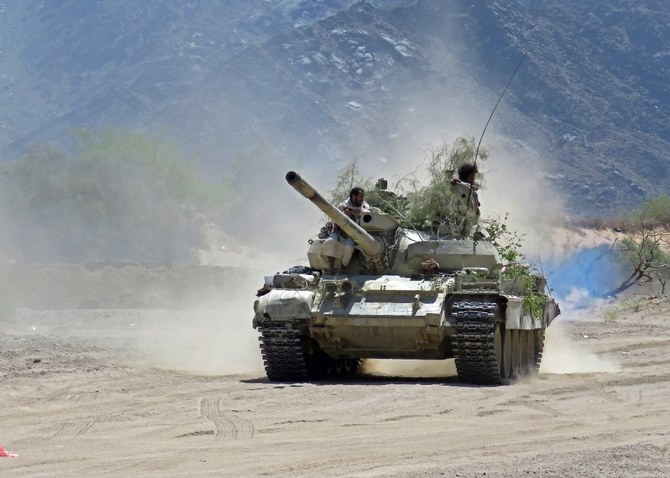AL-MUKALLA: Yemen government troops pushed back Houthi attacks and scored limited advances in contested areas south and west of the central province of Marib, local sources and media reports said on Saturday.
Fighting broke out on Friday when the Houthis attacked troops on hilly terrain overlooking the Al-Amud area, south of Marib, and around a strategic road that links the central city of Marib with Juba district.
With the help of the Arab coalition, the troops and allied tribesmen repelled the assault and later attacked the retreating Houthi forces.
By Saturday afternoon, government troops announced the liberation of small locations and villages in Juba after killing and wounding dozens of Houthis.
Yemen’s Defense Ministry said coalition warplanes had carried out many airstrikes, targeting Houthi gatherings and military equipment.
In the west, heavy clashes also broke out when troops repelled Houthi attacks in Serwah district.
The current round of fighting started in February, when the Houthis resumed an offensive to seize control of the energy-rich city of Marib, the government’s remaining bastion in the northern half of the country.
Despite the deaths of hundreds of civilians and suffering heavy casualties in Marib province, the Houthis have ignored local and international calls for de-escalation and instead intensified their ground attacks and shelling of government-controlled areas.
Army commanders and senior government officials in Marib have vowed to keep fighting the militia and foil its attempts to undermine security in the city.
On Saturday, the Marib Security Committee, chaired by Governor Sultan Al-Aradah, thanked the Arab coalition for its “unlimited” military logistics and air support to government forces battling the Houthis outside the city, ordering local security and military units to remain on high alert to counter their attacks.
Al-Aradah said the coalition’s airstrikes had supported troops, destroyed the Houthis’ military reinforcements, and neutralized their military capabilities on the battlefield.
The government has accused the Houthis of increasing their indoctrination and recruitment of children in areas under their control and of sending them to fight troops.
“(The) Houthi militia intensified recruitment of children under 18 to compensate (for) its depleting fighters, due to unprecedented losses it incurred since its escalation on Marib fronts, in the widest crimes of recruiting children in combat operations in the history of humanity,” Yemen's Information Minister Muammar Al-Eryani tweeted.






















